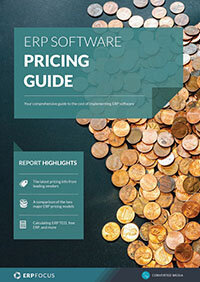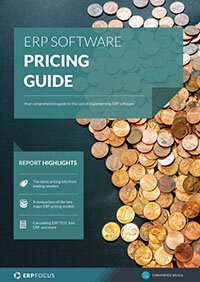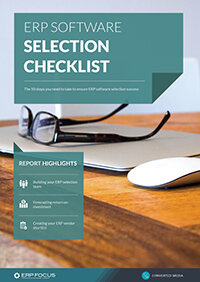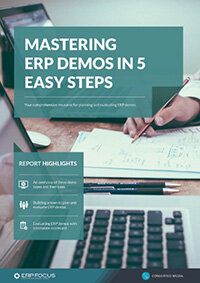300+ projects analyzed in the 2016 ERP Project Report
After 12 months of discussing ERP software projects with key stakeholders and project managers, we have gathered and analyzed data from more than 300 organizations to create our comprehensive ERP Project Report.
If you have ever wondered...
“How long should I expect an ERP implementation to take?”
“What percentage of employees use ERP?”
“What percentage of revenue should we spend on ERP?”
...the data in this report will make for interesting reading.
As well as presenting data on ERP project planning, budgets and platform decisions, we have added our notes on what this data means for ERP projects in 2017.
Download your copy of the 2016 ERP project report
In this report you will learn from the combined wisdom of hundreds of ERP projects to help you:
- Create a project plan including a target “time to implementation”
- Research how ERP platform preferences differ by industry
- Create a realistic and well-reasoned ERP software budget
ERP Project Planning

More people, more time
The more ERP users an organization has, the more time they invest in implementing new ERP software. A large number of users requires extensive training during implementation, which tends to increase implementation timescales.
As a general rule, larger organizations also have more data to migrate from legacy systems and additional account configuration setup when user numbers are high.

Identifying project stakeholders
Typically, just under 50% of a small business’s employees are active ERP users. This highlights the need for small businesses to consult a range of departments before selecting new software.
The lower percentage of ERP users found in enterprise-level companies highlights the need for accurate stakeholder identification processes early on in the selection project.
ERP Platform Choices

Platform (in)decisions
Indicative of current software trends, more companies are actively seeking cloud ERP than on-premise.
Significantly, over half are still undecided on the matter. This could be because cloud software remains an unknown quantity for organizations switching from legacy on-premise systems, or due to senior execs having concerns about cloud ERP security.

Distributors adopting cloud platforms
Cloud ERP is becoming increasingly popular across all industries. Distribution’s strong preference for cloud reflects the need for a real-time system that integrates with client and supplier’s systems.
Meanwhile, process manufacturing companies’ relative lag in seeking out cloud software could indicate security and compliance concerns specific to the sector.
ERP Project Budgets

Cloud budgets are smaller (but are the systems cheaper?)
Lower budgets forecasted for cloud ERP are usually due to lower upfront costs. Those purchasing cloud ERP should be aware of how costs can mount up - cloud is not necessarily cheaper, long-term.
Those in the ‘undecided’ category had the largest budgets, suggesting that they were forecasting generously to account for uncertainties in selection.

Large projects see higher user costs
While the larger the organization the more spent per user (additional training needs, system complexity and services such as data transfer outweigh the initial cost benefits scale brings), small companies’ ERP budgets tend to use a larger percentage of revenue.

The budgetary burden of ERP
The amount of revenue small companies put towards an ERP budget means that new software is often a bigger cost burden than for larger companies, despite a reduced cost per user.
As with many large purchase decisions, ERP software carries a bigger financial risk for small companies than for enterprises.

Budgets higher for replacement and upgrade projects
Established ERP users’ more generous budgets could reflect additional implementation costs such as data migration services and integration with other enterprise software.
Alternatively, this could be down to a certain amount of naivety surrounding hidden costs from those who have never used an ERP before.
Additional Report Data
- 46% of businesses surveyed were implementing their first ERP system
- The average timeframe for selection of an ERP system was 7 months
Download your copy of the 2016 ERP project report
If you have any questions on the data presented in this report, please email editor@convertedmedia.com.
All data and graphics included in the report above are free to use with attribution under a Creative Commons BY-NC-ND license. Please let us know if you have referenced this data, we would love to hear from you.
Method
Data presented in this report was gathered from telephone interviews with project managers and stakeholders from 325 ERP software projects. Data gathered from these conversations covered projects from a range of geographic locations, industries and company sizes. For further demographic information, please contact editor@convertedmedia.com.
Data presented in this report was gathered from July 2015 - June 2016. Budget data quoted was provided by project stakeholders as a budget estimate and does not constitute a price quote. The data presented in this report represents projects which have used ERP Focus for project research and advice, and may not be indicative of the market as a whole. Comments on this data solely represents the views of individuals.
Free white paper

ERP Software Pricing Guide
Get the latest pricing information on over 80 popular ERP systems, and learn how to budget for your ERP project in our free guide

Featured white papers
-

ERP Software Pricing Guide
Get the latest pricing information on over 80 popular ERP systems, and learn how to budget for your ERP project in our free guide
Download -

60-Step ERP Selection Checklist
Get the comprehensive checklist for your ERP selection project
Download -

ERP Demo Guide & Scorecard
Master your ERP demo with 5 easy steps using our free guide (includes demo scorecard)
Download
Related articles
-

The best ERP systems for process manufacturing
Consider these ERP systems when selecting your next process manufacturing ERP
-

How the right ERP can help you launch a successful omnichannel business
Petersen Zhu, CEO of DigitBridge and Vibes Base, shares how to create a scalable omnichannel stra...
-

5 ERP pricing definitions you need to understand
Have you mastered the ERP pricing lexicon yet? Getting to grips with these five definitions is a ...

